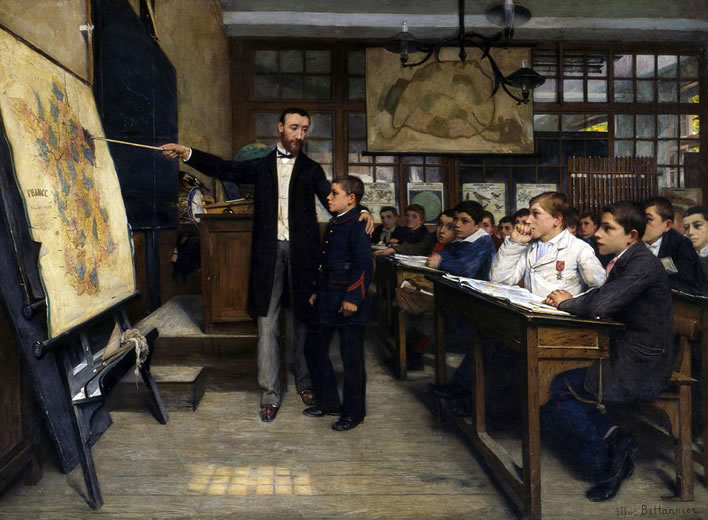European wars
Posted by Mad Mitch on UTC 2016-05-10 14:54
European wars: the executive summary
-
1870: Franco-Prussian War
France felt it had been insulted by the Germans and, confident of a quick and overwhelming victory, declared war. Unfortunately for the French it was the Prussians who had the quick and overwhelming victory. The Prussians charged the French a lot of money for war reparations and took possession of Alsace-Lorraine, the country's industrial heartland. The Prussian success encouraged the creation of the unified German state. The French were bitter and vowed revenge: what's 'we wuz robbed' in French? -
1914: First World War
Having entangled Britain and Russia in a web of alliances and treaties, the Great War – the French revenge for 1870 – started almost by itself. After the war France was instrumental in demanding immense (unpayable) reparations from Germany and what was left of the Austrian Empire. Austria and Germany were plunged into economic chaos, since the only method to pay the reparations was to make the currency worthless. France was also instrumental in creating Czechoslovakia, in which Czech nationalists would be able to persecute the ethnic German minority in the Sudentenland. -
1939: Second World War
Both the economic catastrophe in Germany and the resentment over the humiliating treatment of the country after the Great War had lead to political unrest and to the rise of the Hitler regime. The persecuted German minorities in the east were among the greatest supporters of Nazism. As they had done before the Great War, the French had once again created yet another web of alliances and treaties, which, when Hitler moved to recover the eastern territories, whose existence the French had so unenforceably guaranteed, dragged all the participants into Second World War. -
1945: Post Second World War
The French, most of whom had spent the Second World War safe under the occupying shield of the Germans, recovered economically relatively quickly after the end of the war. After a decade Germany's own economic miracle began; its resentment at its defeat was held in check by a widespread feeling of guilt and a spirit of pacifism that were widespread throughout the postwar years. -
Today
Taking a panoptic view, the European Union and all its predecessor organizations can be seen as a French socialist project paid for by a penitent Germany. Nearly all of the key institutions of the EU are based in France or its satellites; the Germans are allowed to host the European Central bank in their financial capital of Frankfurt, but, since the EU is running mainly on German money this is one of the few rational features of the EU. The current head of the ECB is from Italy, a country admired for its financial integrity.
Conclusion
There have been no such things as 'European wars': there have only been French-German wars which have dragged everyone else in to them. The best way of avoiding 'European wars' in future is to have nothing to do with either France or Germany, but certainly not with France.
The future
Not rosy. Germany is starting to wake up to what it has allowed to be done to it in the name of penitence; even the pacifists are getting tetchy, so that the awakening may be quite robust. From a British point of view it is much better to have nothing to do with France, Germany or the rest of the EU and let them fight it out on their own this time. We'll even borrow a French phrase for this: Cordon sanitaire.

Albert Bettanier (1851-1932), La tache noire (The black stain), 1887. Image: ©DHM/Berlin, analysis (French) L'Histoire par l'image
A French teacher pointing out the 'stain' of the German occupation of Alsace-Lorraine. The occupation took place in 1872, shortly after the disastrous Franco-Prussian War. The flames of French resentment at the occupation were fanned and propagated down the generations until they finally flared up in the mutual butchery of the French and Germans at Verdun in the First World War. The bloody action of the British and Colonial forces on the Somme in 1916 was intended as a diversion that would relieve the French at Verdun. 'So it goes'. [Kurt Vonnegut, Slaughterhouse-Five, (1969)]
Free extra! Pub-quiz crib sheet, 'European Wars' edition
For a pub-quiz held in England*:
- Q: Who started the Franco-Prussian War? A: The French
- Q: Who started the First World War? A: The French
- Q: Who gained most from the First World War? A: The French
- Q: Who started the Second World War? A: The French
- Q: Who spent the Second World War in safe occupation? A: The French
- Q: Who gained most after the Second World War? A: The French
- Q: Who started the European Union project? A: The French
- Q: Who gains most from the European Union project? A: The French
* In Scotland the answer to all questions is: The English.
If the quiz is being held in France please substitute any of the following answers for any of those above:
Les Boches, les Juifs, les Rosbifs
However, if the quiz is being held in Germany please substitute any of the following answers for any of those above:
Die Amis, George Dubya Bush, die CIA, Big-Oil, Atomkraft
Important note: under no circumstance should you use the French answers in Germany.
0 Comments UTC Loaded:
Input rules for comments: No HTML, no images. Comments can be nested to a depth of eight. Surround a long quotation with curly braces: {blockquote}. Well-formed URLs will be rendered as links automatically. Do not click on links unless you are confident that they are safe. You have been warned!